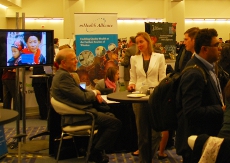Will the mHealth Lollapalooza move us forward


Celebrities like Ted Turner and Bill Gates have addressed a throng estimated at 2,700, triple last year's number.
Norway and HP have both announced million dollar contributions. The Department of Health and Human Services announced a program called Text4Health.
Analysts are comparing it with the Lollapalooza festivals, big rock shows that brought in a lot of excitement and money.
The comparison may be unfortunate. Lollapalooza itself has had an up-and-down history. It began in 1991, then died in 1997, and failed twice more as a tour, before being re-defined as a Chicago-only festival in 2005.
On the other hand, the comparison may be apt. Chicago is, among other things, the headquarters town for American medicine. Today's excitement could easily flame out, as alternative rock did in the late 1990s.
Clive Smith is the mHealth Alliance's director of global operations, and told me today that won't happen. "It's getting ready to explode," he said, in a good way.
That's because, especially in the developing world, the technology for this is widely available. "There are many applications that are text or voice based," that run on old "feature phones" (as opposed to "smart phones" like the iPhone and Android.)
Innovations developed for the smart phone consumer market can quickly filter down to the mass global feature phone market, Smith said. "There will be a rapid migration," he predicted.
The group seems well plugged-in to the global philanthropic mainstream. Its board is headed by a venture capitalist, with a philanthropist and two cell phone executives joining him. The staff is headed by David Aylward, a successful Washington consultant.
But it's today's events, mostly held out of public view, that will mainly tell the tale here. These focus on problems with security, privacy and regulation, which have stymied the American adoption of mHealth.
What happened, as I told Smith, is that consumer products outfits like Apple or Nike might launch something cool in the consumer market, but serious medical applications go through a regulatory process, both medical and insurance, which leaves their sales channels with outdated, primitive solutions that cost 100 times more than what you can find on the street.
"The technical solutions have outstripped the regulatory practice." he admitted.
"Clearly there are many specialized interest groups that have concerns about how this will work, which is one reason so much innovation is happening elsewhere. In other countries mobile is the difference between health care and no health care."
The expectation is that clinical studies now coming forward and interest from mainstream IT vendors like HP will break down these barriers.
That's the expectation. Or is it more like a hope?